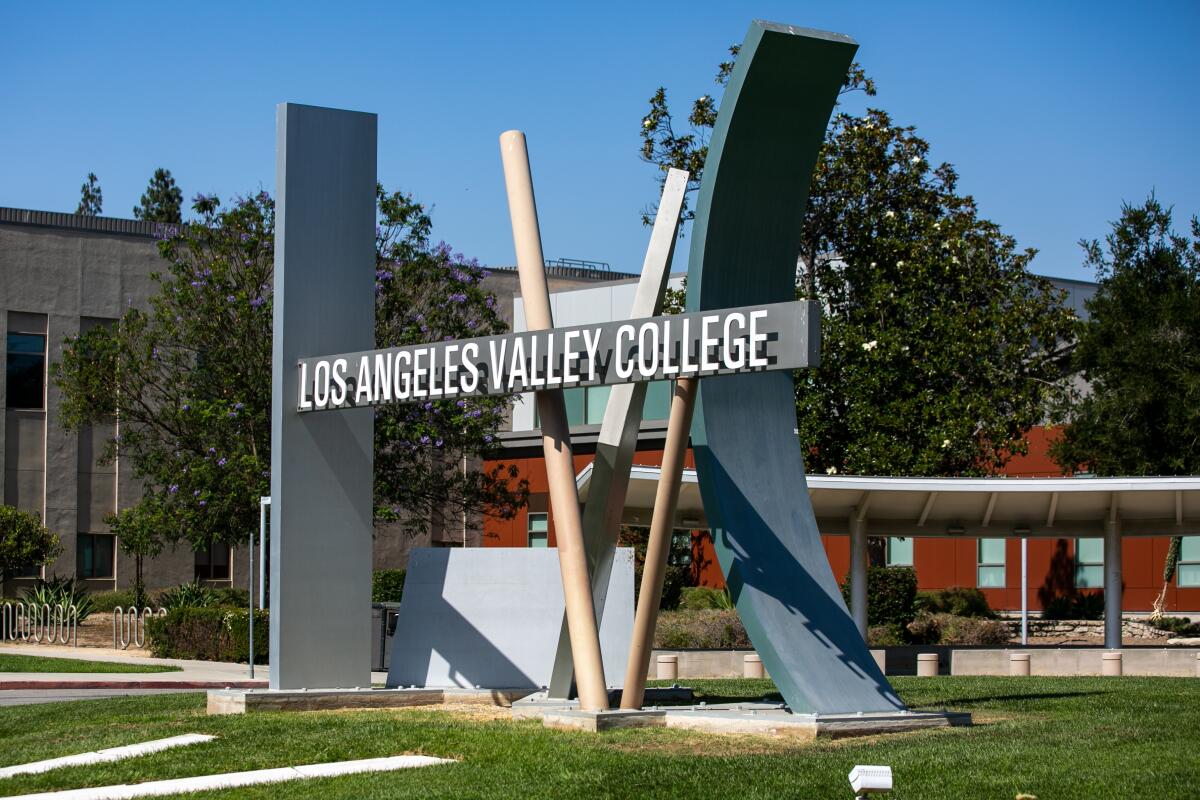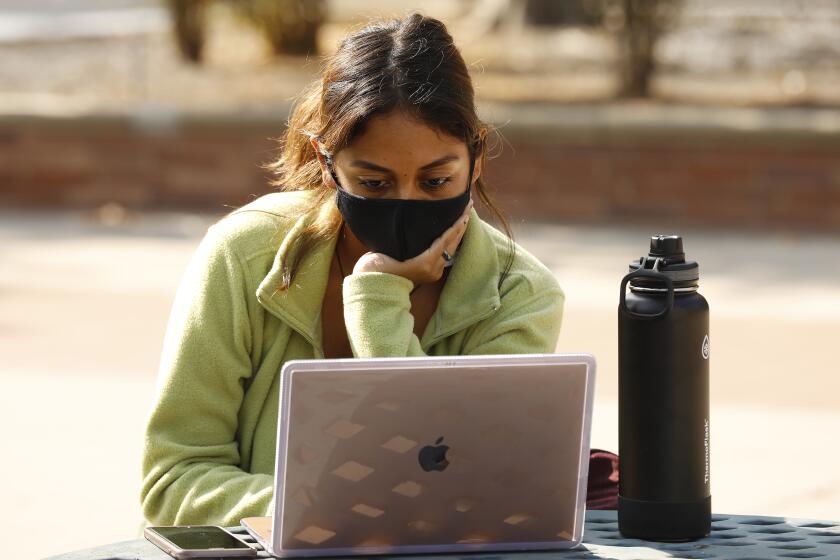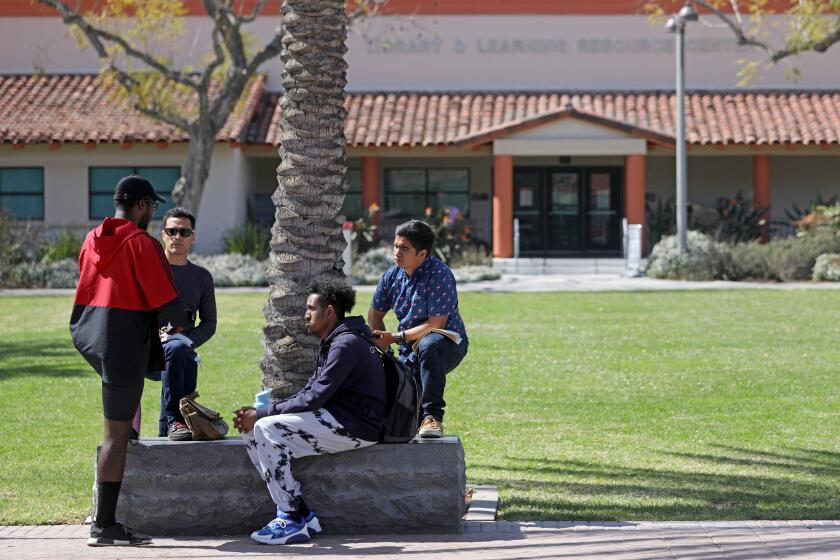L.A. community colleges seek voter OK for $5.3-billion building bond, its largest ever

- Share via
The Los Angeles Community College District will go to voters in November asking homeowners to tax themselves between $88 and $157 a year — and in some cases more — so the district can borrow billions of dollars in what would be its largest-ever construction bond program.
College trustees, who approved the $5.3-billion bond measure 6 to 1 last month, filed paperwork Thursday with the Los Angeles County Registrar-Recorder/County Clerk for inclusion of the bond measure on the Nov. 8 general election ballot.
Supporters say the infusion of cash is necessary to revamp aging buildings, upgrade athletic fields and outfit classrooms with new technology across the district’s nine campuses, the largest community college system in California.
“Students deserve excellent teaching and learning facilities,” LACCD Chancellor Francisco Rodriguez said at a July 6 meeting. “We know that when students are connected to campus, when they engage … our students do better.”
But critics question the timing and necessity of the ballot measure. They argue it is wasteful to spend billions of dollars on campus infrastructure amid significant enrollment declines and an unstable economy.
Undergraduate enrollment has yet to rebound since the start of the pandemic.
At least 55% of voters must approve the ballot measure in November for it to pass. According to the district, the bond could cost property owners up to $25 per $100,000 of assessed value for nearly 25 years.
For homeowners, the estimated annual property tax payment for the bond would probably range from about $88 to $157, according to the district, but could be more for high-valued homes. The district did not provide estimated calculations for nonresidential property.
Ernest Moreno, the lone trustee who voted no, said it is inappropriate to spend money on new construction when the community college district lost tens of thousands of students over the last several years.
Between 2019-20 and 2020-21, enrollment plummeted to 220,986 students — a decline of nearly 27,000 learners, according to state data. Many students have also opted to continue taking classes online.
“This is an inappropriate time and essentially an irresponsible act on our behalf to pursue this bond,” Moreno said. “What I’m fearful is we’re building a ghost town.”
Moreno said in a phone interview that he supported previous bond measures. Over the last two decades, voters have green-lighted more than $9 billion in bonds for the district.
But the system’s history with managing projects financed by bonds has at times been marked by troubles.
A 2011 investigation by the Los Angeles Times exposed financial waste, nepotism and mismanagement of projects the district paid for through bonds.
Following The Times’ report, district officials vowed strict oversight of public money. Even so, the last bond measure in 2016, which supported a $3.3-billion plan to upgrade outdated buildings, spurred lawsuits, political infighting and missed performance targets.
Rolando Cuevas, a community activist who served as student body president at East Los Angeles College in the 1990s, worries the projects will benefit developers and construction companies more than students.
He added that it is irresponsible to take on debt given the economic climate.
“There’s nothing wrong with bonds when we need them,” Cuevas said. “What they’re doing here is unacceptable. The voters need to say ‘no.’”
This week, a construction company filed a lawsuit against the LACCD and its project team, alleging corruption and fraud over a long-delayed theater project at Los Angeles Valley College.
The company, Pinner Construction Inc., and its subcontractors accuse the L.A. district’s project team of conspiring to delay the theater’s construction so contractors could accumulate more billable hours. Trustees declined to comment on the litigation.
Trustees pledge the board has cleaned up its process for managing the implementation of bonds.
Steve Veres, a trustee since 2011, said the projects covered under the current proposal target precise needs. Students’ learning experiences will be boosted by improving aging buildings, including campus health centers and student unions, he said.
New research suggests colleges’ policies around unpaid balances may be contributing to an enrollment decline while doing lasting financial harm to students.
“Sometimes the way things were designed 50 years ago are not the best and most efficient uses for today,” Veres said. “We’re not adding square footage ... we’re improving the spaces that are there.”
If passed, $1.4 billion would go toward modernizing buildings constructed before the 1970s. Another $732 million would pay for other campus infrastructure, such as outdoor lighting, sidewalks and parking lots. The proposal also sets aside $500 million to “plan, construct, acquire or contribute” to housing for students and workers.
Money from the bonds would also finance upgrades to athletics facilities, including artificial turf installations and replacing or resurfacing hard courts. It would also expand wireless internet access and equip classrooms with new technology, among more routine upgrades such as repairing aging sewer lines.
Renovations will alleviate the need for patchwork fixes, which have already cost the district millions of dollars, according to Rueben Smith, a vice chancellor who oversees facilities for the LACCD.
“We’ve had a multitude of breakdowns and failures with infrastructure,” Smith said during the trustees meeting. “Breaks are not going to stop. We’ve already spent over $40 million in just repairs.”
The district commissioned a research firm to survey nearly 900 voters about their opinions on a bond measure. The survey, conducted by Fairbank, Maslin, Maullin, Metz & Associates, found 6 in 10 voters would support the proposal.
The firm concluded the measure has “strong initial support that crosses nearly all geographic and demographic subgroups within the district,” according to a presentation to trustees about the survey.
Labor groups representing workers in trades and vocational careers have expressed support.
Among them is International Brotherhood of Electrical Workers Local 11, a union that represents electricians. Many of the 2,000 apprentices in IBEW‘s electrical apprenticeship program are taking classes or have graduated from the L.A. district, according to Antonio Sanchez, the group’s political director.
“Many of our members know the system well and have benefited from it,” Sanchez said. “Frankly they deserve — along with everyone else in Los Angeles — first-class facilities.”
More to Read
Sign up for Essential California
The most important California stories and recommendations in your inbox every morning.
You may occasionally receive promotional content from the Los Angeles Times.
















